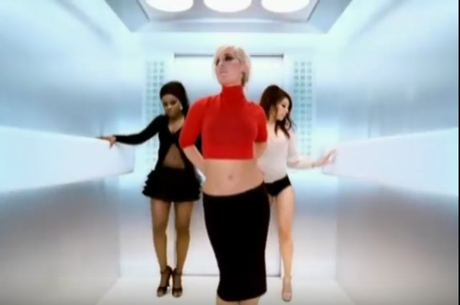
Credit: YouTube
“Wow, they’re beautiful,” I thought to myself at nine years old as I watched yet another music video by yet another girl group for the hundredth time. I admired these women, in all their scantily clad glory. I aspired to emulate their confidence, physical beauty, and the senses of entitlement and pride they seemed to feel about their own bodies. These pop sensations were my idols.
But at the age of thirteen, watching the same videos conjured words like “slut” and “tease” instead. I watched the women featured in Sugababes’ “Push the Button” gyrate their bodies over men like strippers, and deemed their movements vulgar. I pondered why these men, who were presented as so strong and influential, lusted after girls who made themselves so available, who were so promiscuous, who acted so… sleazily.
At school, we applied these same attitudes towards women in the media to young women in our own lives. We would gossip about the girl next to us — “She’s such a slut” — or the blameless girl passing in the corridor — “She looks like a whore in that skirt.” We didn’t comprehend how we were feeding into the stereotypes that society had already planted on us. Our mindsets had clearly been intensely influenced to internalize misogyny, had been altered by society over such a seemingly trivial period of time.
But that changed one day when a girl in one of my classes was sent home because her skirt was deemed too short, and her chest not covered enough. She was sent home even though the boy who sat next to her that day was wearing rather short shorts, too. Outside, during a break from classes, I noticed a boy had taken his shirt off completely. Hell, where was their punishment? I started to ponder: Why are women disproportionately scrutinized and then even punished for their bodies? Where’s the justice in any of this?
I got home that day and started to watch music videos a little differently.
Now, as I’m approaching twenty, I’ve started noticing quite a few things that make me feel differently.
I noticed that the girl who lost her virginity to a boy she had been dating for five months was branded a “tramp” and “desperate,” while the boy — who had previously, drunkenly bedded a number of other women — was praised.
I noticed that my best friend would try on fifty outfits before a party because she didn’t want to look “easy.”
I noticed the girl in the corner of the school hallway sobbing, because her nude photos had been sent around the school by her ex-boyfriend.
I noticed that I suddenly felt a sense of awkwardness in conversations with groups of guys, who would purposely either exclude or include me only to then sexualize me.
I noticed that I felt uneasy around men in general.
I noticed that my male friends would laugh about having “had sex” with a girl who was too drunk to remember her own name.
I noticed that I couldn’t trust men.
I partly blame myself. From a young age, I fed into their egos. We all did. We made them believe that calling women “sluts” and “skanks” was okay, because we called them that, too. We let them believe that women should be reduced to, judged on, and insulted based on their public presentation of sexuality because we did, too.
So now, I’m “pro-hoe.” But I’m also pro-virgin. I’m pro-sex on the first date. I’m pro-waiting until marriage. I’m pro-anything that you’re comfortable with. I’m pro-do whatever the hell you like with your body, support whatever the hell other women want to do with theirs, and forget about societal standards.
Next time you see a woman flirting with guys, or wearing a short skirt, don’t brand her “easy” or a “whore.” Doing so only makes it okay for men to do so, too. Instead, brand her as a beautiful, brave, and, above all, a downright strong woman who’s made the choice to bash down the standards that this patriarchal society built for her.

